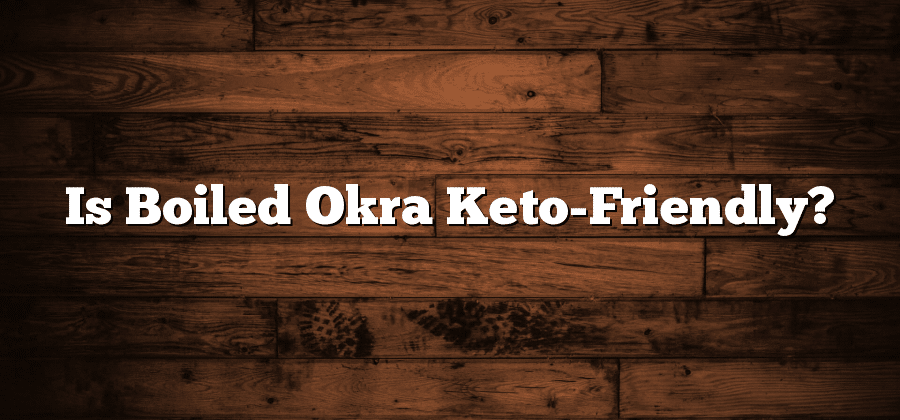The Nutritional Profile of Boiled Okra
Boiled okra is a nutritious vegetable that offers several health benefits. One cup of boiled okra contains approximately 33 calories, making it a low-calorie food option. It also provides essential nutrients such as vitamin C, vitamin K, and folate. Additionally, boiled okra is rich in dietary fiber, which aids in digestion and helps maintain bowel regularity.
Vitamin C is an important antioxidant that supports the immune system and promotes healthy skin. Boiled okra contains about 23 milligrams of vitamin C per cup, which contributes to the recommended daily intake for adults. Vitamin K plays a crucial role in blood clotting and bone health. With around 40 micrograms per cup, boiled okra can help meet your body’s requirements for this essential nutrient.
Folate is another vital nutrient found in boiled okra. This B-vitamin is necessary for DNA synthesis and cell division. Consuming one cup of boiled okra provides approximately 37 micrograms of folate, contributing to the recommended daily intake for adults. Moreover, the high fiber content in boiled okra can aid weight management by promoting feelings of fullness and reducing calorie intake throughout the day.
By incorporating boiled okra into your diet regularly, you can enjoy its nutritional benefits while maintaining a balanced eating plan conducive to good health.
• Boiled okra is a low-calorie food option, with approximately 33 calories per cup.
• It is rich in essential nutrients such as vitamin C, vitamin K, and folate.
• One cup of boiled okra provides about 23 milligrams of vitamin C, contributing to the recommended daily intake for adults.
• Boiled okra contains around 40 micrograms of vitamin K per cup, supporting blood clotting and bone health.
• Consuming one cup of boiled okra contributes approximately 37 micrograms of folate to your diet, necessary for DNA synthesis and cell division.
• The high fiber content in boiled okra aids digestion and helps maintain bowel regularity.
• The fiber in boiled okra also promotes feelings of fullness and can aid in weight management by reducing calorie intake throughout the day.
Understanding the Ketogenic Diet
The ketogenic diet, often referred to as the keto diet, is a low-carbohydrate and high-fat eating plan that has gained popularity in recent years. The main goal of this diet is to shift the body’s metabolism into a state called ketosis, where it primarily burns fat for fuel instead of carbohydrates. By drastically reducing carbohydrate intake and increasing fat consumption, the body enters a metabolic state that promotes weight loss and various other health benefits.
One of the key principles behind the ketogenic diet is restricting carbohydrate intake to very low levels. This forces the body to utilize an alternative source of energy known as ketones, which are produced from stored fats in the liver. By relying on fat for fuel instead of glucose derived from carbohydrates, individuals following this diet can experience significant weight loss.
In addition to its potential for weight loss, research suggests that the ketogenic diet may have several other health benefits. Some studies have shown that it can improve insulin sensitivity and blood sugar control in individuals with type 2 diabetes. Furthermore, it has been associated with reduced inflammation markers and improved cognitive function in certain populations.
Overall, understanding the basics of the ketogenic diet is essential before embarking on this eating plan. It involves significantly reducing carbohydrate intake while increasing healthy fat consumption to promote ketosis and reap its potential benefits such as weight loss and improved metabolic health. However, it’s important to consult with a healthcare professional or registered dietician before starting any new dietary regimen to ensure it aligns with individual needs and goals.
The Importance of Low Carbohydrate Foods on the Keto Diet
Low carbohydrate foods play a crucial role in the ketogenic diet. This dietary approach focuses on consuming high amounts of healthy fats, moderate protein, and very low carbohydrates. By significantly reducing carbohydrate intake, the body is forced to enter a state called ketosis. During ketosis, the body switches from using glucose as its primary source of energy to utilizing stored fat instead.
One of the main benefits of incorporating low carbohydrate foods into the keto diet is that it helps maintain stable blood sugar levels. When we consume carbohydrates, they are broken down into glucose and quickly absorbed into our bloodstream. This leads to spikes in blood sugar levels followed by crashes, causing fluctuations in energy levels throughout the day. By limiting carbohydrates and relying on fats for fuel instead, individuals on a keto diet experience more consistent energy levels without these drastic highs and lows.
Another advantage of low carb foods on the keto diet is their ability to promote weight loss. Carbohydrates are easily converted into glucose and used as immediate energy sources by our bodies. However, when we consume excess carbs beyond what our bodies need for immediate use, they get stored as glycogen or fat reserves. By restricting carb intake and depleting glycogen stores through ketosis, individuals can tap into their fat stores for fuel instead. This process can lead to significant weight loss over time.
Incorporating low carbohydrate foods into your daily meals while following a ketogenic lifestyle not only supports stable blood sugar levels but also aids in achieving sustainable weight loss goals. It’s important to focus on whole food sources such as leafy greens, non-starchy vegetables like okra with its minimal carb content per serving size (approximately 4 grams), lean proteins like chicken or fish, and healthy fats like avocados or olive oil. By prioritizing these nutrient-dense options while minimizing processed foods high in refined sugars and grains, you can optimize your success on the keto diet journey
Carbohydrate Content in Okra
Okra, also known as lady’s finger or gumbo, is a popular vegetable that is widely consumed around the world. When it comes to the ketogenic diet, understanding the carbohydrate content of different foods becomes crucial. Okra is considered a low-carbohydrate food and can be incorporated into a keto meal plan.
In a 100-gram serving of boiled okra, there are approximately 7 grams of carbohydrates. This makes it an excellent choice for those following a low-carb or ketogenic diet. The majority of these carbs come from dietary fiber, which plays an important role in maintaining digestive health and promoting satiety.
One key aspect to consider when incorporating okra into your keto diet is its impact on ketosis. Due to its high fiber content and relatively low net carb count, okra has minimal effect on blood sugar levels and insulin response. This means that consuming boiled okra can help you stay in ketosis while enjoying its nutritional benefits.
Overall, boiled okra offers a favorable carbohydrate profile for individuals following the ketogenic diet. With only 7 grams of carbs per 100 grams serving and its positive impact on ketosis, this versatile vegetable can be enjoyed as part of a well-rounded keto meal plan without compromising your dietary goals.
The Impact of Fiber on Ketosis
Fiber plays a crucial role in the ketogenic diet by impacting ketosis. Unlike other carbohydrates, fiber is not fully digested or absorbed by the body. Instead, it passes through the digestive system relatively intact. This unique characteristic of fiber has several important implications for those following a keto lifestyle.
Firstly, consuming high-fiber foods can help maintain stable blood sugar levels, which is essential for achieving and sustaining ketosis. Fiber slows down the release of glucose into the bloodstream, preventing spikes in insulin production that could hinder fat-burning processes. By promoting stable blood sugar levels, fiber helps to keep our bodies in a state of ketosis.
Secondly, incorporating adequate amounts of fiber into your keto diet can support healthy digestion and prevent constipation – a common issue when transitioning to this low-carb eating plan. The bulk provided by dietary fiber helps regulate bowel movements and promotes regularity. Moreover, certain types of soluble fibers act as prebiotics that nourish beneficial gut bacteria and contribute to overall gut health.
Lastly, high-fiber foods are often nutrient-dense and can provide additional health benefits beyond their impact on ketosis. Foods rich in fiber such as okra also contain vitamins, minerals, antioxidants, and phytochemicals that support overall well-being. These nutrients play vital roles in maintaining optimal immune function and reducing the risk of chronic diseases like heart disease and diabetes.
Incorporating high-fiber foods like okra into your ketogenic diet not only supports proper digestion but also aids in stabilizing blood sugar levels while providing essential nutrients for overall health maintenance. Remember to prioritize whole food sources of fiber rather than relying solely on supplements or processed products labeled as “high-fiber.” Aim to include a variety of fibrous vegetables along with other low-carbohydrate options to optimize your ketogenic journey towards improved well-being.








